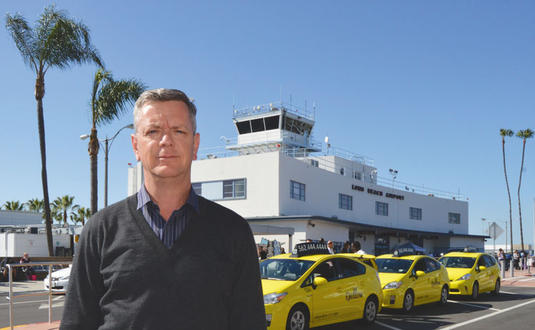Beginning April 1, rideshare companies such as Lyft and See Jane Go will be permitted to pick up travelers from Long Beach Airport (LGB) as part of a six-month pilot program.
“Along with many new services and products that are emerging as part of the ever-changing tech economy, TNCs [transportation network companies] will give LGB travelers another option for their transportation needs when arriving at LGB,” Airport Director Jess Romo said.

William Rouse, manager of Long Beach Yellow Cab, believes the recent pilot program for rideshare companies (TNCs) such as Lyft and Uber to operate at Long Beach Airport was a missed opportunity to address the disparity between TNC and taxicab regulations. (Photograph by the Business Journal’s Larry Duncan)
“Our data show that travelers want this option at LGB,” Romo added. “It is important for us to respond to this demand in a programmed and responsible way.”
While the decision brings more options to the customer, Long Beach Yellow Cab General Manager William Rouse believes the process of developing the pilot program was poorly handled. According to Rouse, a discussion needs to take place regarding safety standards and regulations imposed on taxi companies to which TNCs are immune. He said the drafting of this program was a perfect opportunity to address this disparity.
“The city passed a pilot program in December and then added onto it that the stakeholders’ opinions needed to be gathered, but there was no review after the stakeholders’ input was gathered, in terms of the decision-making process,” Rouse said. “There was literally nothing changed whatsoever, and we didn’t feel that we had meaningful input into the process.”
Operating costs were an area of great concern for Rouse, who described the disparity in regulation and expenditures between TNCs and the taxicab industry as an “unlevel playing field.”
Rouse pointed out that the disparity is evident by more stringent regulations on taxis, which increase costs far beyond those of TNCs. He explained that Yellow Cab pays $550 for each of its 171 vehicles every year for the right to operate within the city, a fee he said TNCs do not pay.
Additionally, Rouse explained that Yellow Cab is required to allow annual city inspections for all vehicles and have each of its drivers fingerprinted, which costs $300. These are not requirements for TNCs, whose drivers utilize their own vehicles and have no government oversight with regard to driver background checks, according to Rouse.
“We’re not opposed to Uber and Lyft working at the airport, but we are feeling like the input that we offered at this hearing was essentially meaningless,” Rouse said. “Everybody across the country acknowledges that the regulatory burden placed on the taxi industry is overwhelming compared to the light regulations put on the TNCs.”
When it comes to the cost of operating at LGB specifically, Yellow Cab pays $500 per month to operate at LGB, while rideshares will be charged $3 for every drop-off or pickup, according to airport officials. Based on these figures, for a rideshare company to reach $6,000 in annual airport fees, it would require, on average, a little less than five and a half rides per day.
It is unclear how rideshare companies will pay the fee, as LGB has no authority to dictate these terms to companies, but according to an airport spokesperson, these costs are typically passed on to the customer.
“If you look at airports such as San Francisco and Los Angeles, where they do charge those fees, a huge amount of that fee is actually spent on the mechanism to collect the fee,” Rouse explained. “LAX only gets $1.70 out of the $4 it collects.”
Other ground transportation services such as limos, shuttles and private cars pay annual permit fees to operate at the airport. Reservation-based transportation providers currently pay $50 per year, while non-reservation-based providers pay $1,000 per year. However, LGB has proposed raising the fees to $100 and $1,200, respectively.
The goal of the program is to gauge the impacts associated with adding rideshare services to be able to create a permanent policy that is fair to all parties involved, according to Romo. He explained this is the beginning of a multi-year modernization of LGB’s ground transportation to better align with industry standards in order to provide better service, improve access and level the playing field.
